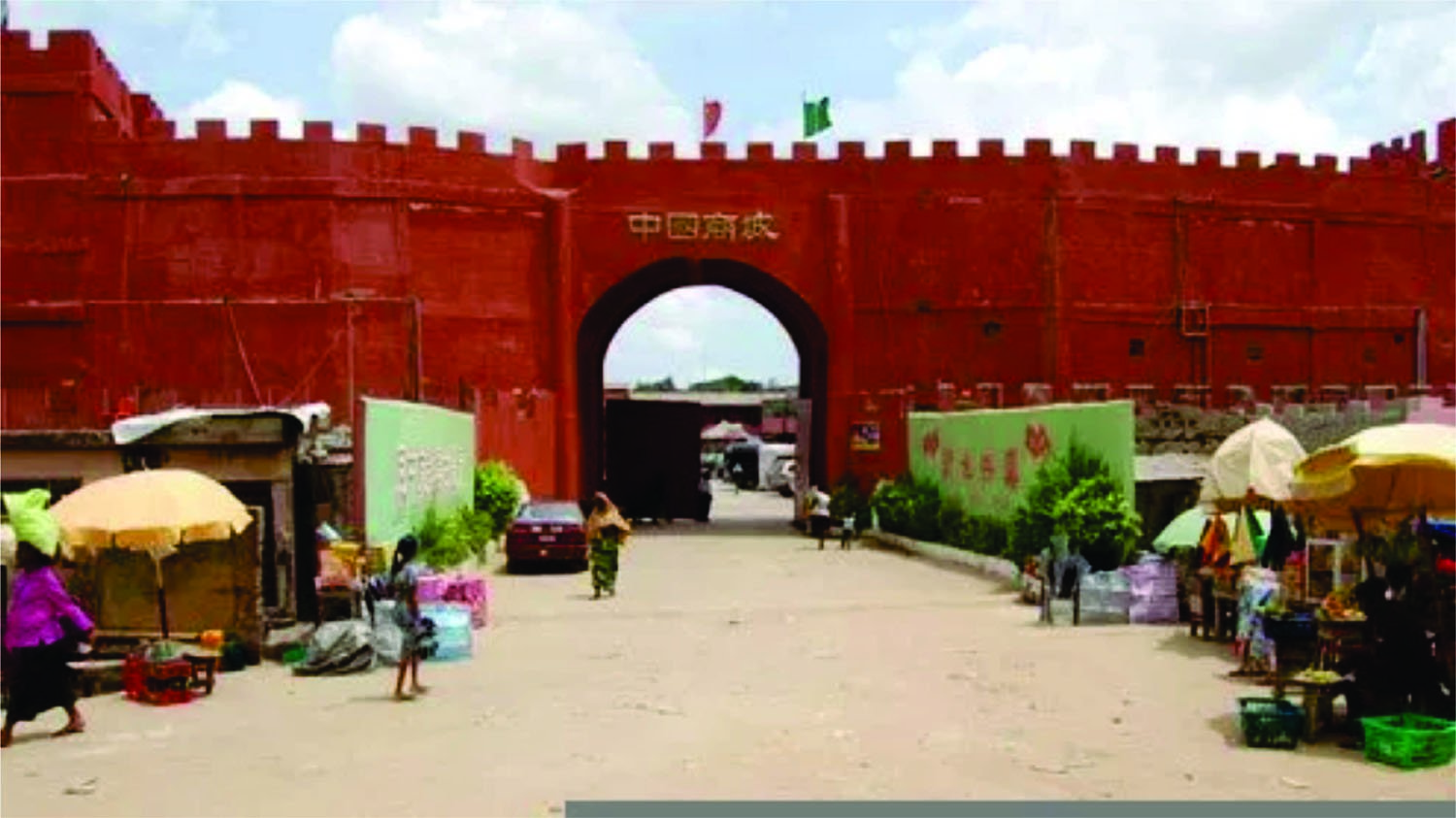
The existing frosty bilateral relationship between some African countries and China which has largely led to bitter acrimonies may have further fuelled fears in some quarters that Asia’s Super Tiger has clearly hidden motives behind its quest to invest in Nigeria, Africa’s largest economy and most populous black nation. Ibrahim Apekhade Yusuf and Daniel Adeleye in this report examine the issues
‘’When a handshake goes beyond the elbow, it ceases to be a friendly gesture and signals a fight.”
The above wisecrack becomes apposite in describing the existing poor relationship between China and some of its former allies both within the continent of Africa and beyond. China’s incursion into Africa which began on a friendly note has become less cordial over time, no thanks to irreconcilable difference by the parties.
China’s scramble for Africa
China’s contact with Africa can be traced to the time when Zheng’s fleet arrived at the Indian Ocean west coast in today’s Kenya about 600 years ago during the Tang dynasty. But official relations with the continent dates back to the 1950s when most African nations attained independence and China’s economic engagement with black nations at a strategic level gained currency early 21st century.
Consequently the country’s investments in Africa have increasingly diversified into manufacturing, retails, business services, mining, banking and construction industries.
The influence of China can be felt in several countries of Africa, which clearly shows that in spite whatever anybody would say or argue, the Chinese are really in for a complete physical, mental and ideological contestation in Africa.
China has catapulted from being a relatively small investor in the continent to becoming Africa’s largest economic partner. Africa-China trade is poised to grow 20% year on year making it seem like dragons are the new king of the African jungle.
Investment in Africa has however been structured around Chinese ownership, with roughly 90% of firms either majority controlled or owned outright by Chinese nationals. There are estimated to be over 10,000 Chinese firms in Africa that have created work for several million Africans. This economic stimulus continues to have significant economic impact in communities riddled with historic economic disparities.
Chinese firms have shown remarkable prowess in sectors such as manufacturing, resources, and infrastructure. One of the first famous examples is the Tanzania-Zambia Railway built between 1970 and 1975, for which China provided a zero-interest loan of RMB980 million ($150 million). Sectors including agriculture, banking, insurance, transport and logistics, housing, information communications technology and telecommunications are poised to see significant shifts to Chinese firms. Chinese firms have the benefit of tried-and-tested business models which bear great similarities to the African marketplace.
According to The Economist, Africa’s growth is primarily attributable to China’s demand for African resources. Analysing the phenomenon in detail, the impact of Chinese investments is based on seven factors: commodity prices, capacity to extract, infrastructure, manufacturing, employment, market access and consumers. On the other hand, it has to be noted that the costs of China’s contribution to African infrastructure may exceed the benefits, Chinese investment transfers limited technology, skills, and employment to Africa; Chinese investment may deindustrialise Africa; African manufacturing productivity is low and African goods are more expensive than similar Chinese ones.
It is now nine years since China overtook the US as Africa’s largest trading partner. Although Kenya and Ethiopia were the only two African nations among the 30 countries signing economic and trade agreements at the Belt and Road Forum (Barf) in Beijing in May last year, China has been busy on the continent.
The flagship Belt and Road project is Kenya’s 290-mile railway from the capital, Nairobi, to the port city of Mombasa, which opened to the public last year. There are plans to extend that network into South Sudan, Uganda, Rwanda and Burundi; it was already the country’s largest infrastructure project since independence.
Meanwhile, landlocked Ethiopia got a 470-mile electric railway from its capital, Addis Ababa, to the port in the neighbouring dictatorship of Djibouti. The £2.5bn project – financed by a Chinese bank and built by Chinese companies – opened in January. Addis’s new light rail system, too, was funded and built by China, and operated by Shenzhen Metro Group. And Djibouti, in exchange for major investments, preferential loans, a pipeline and two airports, got China’s first overseas military base.
While east Africa has been the main focus of Belt and Road on the continent, Chinese infrastructure projects stretch all the way to Angola and Nigeria, with ports planned along the coast from Dakar to Libreville and Lagos. Beijing has also signalled its support for the African Union’s proposal of a pan-African high-speed rail network.
Writing on the impact of Chinese investment and trade on Nigeria economic growth, Djeri-wake Nabine said, “According to the China Customs, the bilateral trade volume between China and Nigeria in 2006 reached US$3.13 billion, up by 10.6, from 2000 to 2006, among which China’s export to Nigeria was US$2.85 billion, up by 23.9, while China’s import from Nigeria was US$280 million, down by 47.3. China had a surplus of US$2.57 billion. China mainly exported motorcycles, machinery equipment, auto parts, rubber tires, chemical products, textiles and garments, footwear, cement…China’s increasing presence in Nigeria, and elsewhere in Africa, has spurred much speculation about the nature of the emerging partnership model. A national debate across sectors on this partnership will be a healthy exercise and may drive more rigorous analysis of what best serves African countries’ quest for human material advance; friendly, mutually beneficial relations in trade and politics; and stewardship of the shared heritage of the planet.”
A peep into China-Nigeria relations
The bilateral relations between the Federal Republic of Nigeria and the People’s Republic of China have expanded on growing bilateral trade and strategic cooperation. China is considered one of Nigeria’s closest allies and partners. China is also one of Nigeria’s important trading and export partners. According to a 2014 BBC World Service Poll, 80% of Nigerians view China’s influence positively, with only 10% expressing a negative view, making Nigeria the most pro-Chinese nation in the world.
Nigeria and the People’s Republic of China established formal diplomatic relations on February 10, 1971.Relations between the two nations grew closer as a result of the international isolation and Western condemnation of Nigeria’s military dictatorships (1970s-1998). Nigeria has since become an important source of oil and petroleum for China’s rapidly growing economy and Nigeria is looking to China for help in achieving high economic growth; China has provided extensive economic, military and political support.
Bilateral trade reached US$3 billion in 2006 – up from $384 million in 1998.During Chinese President Hu Jintao’s visit in 2006, China secured four oil drilling licenses and agreed to invest $4 billion in oil and infrastructure development projects in Nigeria, and both nations agreed to a four-point plan to improve bilateral relations – a key component of which was to expand trade and investments in agriculture, telecommunications, energy and infrastructure development.
Furthermore, China agreed to buy a controlling stake in the Kaduna oil refinery that would produce 110,000 barrels per day (17,000 m3/d). Nigeria also promised to give preference to Chinese oil firms for contracts for oil exploration in the Niger Delta and Chad Basin. In 2006, China also agreed to grant a loan of $1 billion to Nigeria to help it upgrade and modernise its railway networks. In 2005 Nigeria agreed to supply PetroChina with 30,000 barrels per day (4,800 m3/d) of oil for $800 million.
In 2006 the CNOOC purchased a share for $2.3 billion in an oil exploration block owned by a former defence minister. China has also pledged to invest $267 million to build the Lekki free trade zone near Lagos.
However, the “flooding” of Nigerian markets with cheap Chinese goods has become a sensitive political issue, as – combined with the importation of second-hand European products – it has adversely affected domestic industries, especially in textiles, and led to closure of 65 textile mills and the laying-off of 150,000 textile workers over the course of a decade.
Chinese companies’ investments in Nigeria
As at last year, the quantum of investment in the Nigerian economy by Chinese companies hit $20bn.
According to the President, China Chambers of Commerce in Nigeria, Mr Ye Shuijin, about 160 Chinese firms operating in the country had also employed over 200,000 Nigerians, noting that the companies were promoting what he called the ‘people to people’ cultural diplomacy of the Belt and Road Initiative of the People’s Republic of China in Nigeria.
Shuijin, who is the Managing Director, China Geo-engineering Company, stated that his company, which was established in Nigeria in 1983, had offices in 30 states.
He said that CGC, a construction firm, had faced and surmounted various challenges, adding that the improved infrastructure development in the country, however, was encouraging many more Chinese businessmen and firms to invest in the economy.
He said, “I believe the Chinese investment in Nigeria now is about $20b and we have employed over 200,000 Nigerians. Our workforce is 95 per cent Nigerians.
“We also worked with the Industrial Training Fund to train over 1,000 Nigerians last year and we have similarly trained 350 Nigerians in agriculture export. We have sponsored 30 students to China on scholarship as part of our advanced capacity building for Nigerians.”
The Chinese Chambers President refuted reports that ex-prison inmates were being brought into the country to work as expatriates, insisting that it was not possible to do such a thing, adding that the Chinese embassy monitored the Chinese companies.
Yuan swap deal
It may be recalled that the Central Bank of Nigeria (CBN) had in June 2018 signed $2.5 billion three-year currency swap currency swap deal with the People’s Bank of China.
The auction is part of efforts to encourage the use of an alternative trading currency to the U.S. dollar especially as Nigeria imports heavily from China.
Anxiety over Chinese investment
In a report by the International Monetary Fund (IMF) published September 2017, the Fund noted that high levels of Chinese aid to African states have had a “harmful effect” on human rights and economic development across Africa.
Echoing similar sentiments, a former Civil Liberty Organisation (CLO) chairman, Dr Nosaze Ehonwa Osaze, at a forum warned African leaders to be wary of the kind of business relationship existing among them and the Chinese government to avoid the looming wave of colonialism of the continent a second time.
Although, he acknowledged that interdependence is the fulcrum upon which the wheel of progress runs, but cautioned Africa partners against what he described as unfair and unbalanced investment relationships, which he believed may undermine and endanger the nations that are the receiving end of such relationship.
“Chinese investments, one dare say it presents Africa with a new set of scrambling attempts and challenges.
“The west is also not paying scant attention to the new influence of China in Africa, both nations are on a binge to establish their presence in Africa. As much as Africa needs investment from the West and China, the strategic interest of black nations must not be toyed with,” he warned.
A former President of the Nigerian Bar Association, Dr Olisa Agbakoba (SAN), has said the trade relationship between Nigeria and China is skewed in favour of China, with Nigeria getting nearly nothing.
He argued that the bilateral relationship favoured China more because the Asian country had found in Nigeria a large market to keep pushing its manufactured products; while Nigeria on the other hand remained a consuming country, depending on imports.
He said, “The trade between Nigeria and China is so skewed in favour of China and we’re getting nothing; we’re import-dependent; everything is imported. If everything continues to be imported, where is our hope? We import toothpicks from China. I was listening to the DG of NAFDAC the other day talking about drugs; we import everything. This has just got to change.”
To address the problem, Agbakoba however called for caution, citing the Zambian example, where China had taken over the Africa country on account of default on a loan repayment.
He said, “The other day, I saw in Zambia, the head of Zambian police decorating a Chinese policeman who had taken over the Zambian police because Zambia defaulted on a loan. So, there are wider implications.”
However, Prof. Jonathan Aremu, a professor of International Economic Relations at the Covenant University, Ota, Ogun state, said Chinese investments in Nigeria is not a threat.
The don who stressed that negotiation is the key factor that defines solid relationship between two countries, to defend their interests, noted that no nation of the world that actually get what they deserve they only get what they negotiate.
Aremu who recalled that China did not actually come into the global economy until the 1970s, when she joined International Monetary Fund, IMF and WTO in 2001, said, “When Chinese opened their borders and foreign investors were coming in 70s and 80s, they negotiated with those visitors and set up first economic zone in forty coaster cities, and make sure those companies operating there did so in the ambit of agreement they reached. So if you just allow anybody into your country from any part of the world without negotiating then it’s your fault.
“In the early 80s when Chinese were coming into Nigeria, I was working in the Research of Central Bank of Nigeria, CBN, and I had access to a lot of documents that allowed them to penetrate the global economy.”
Speaking on the issue of Chinese making Nigeria and other African countries dumping grounds for substandard goods, Aremu blamed the issue on those that man borders where those are coming into a country.
“We have people that man our borders and these countries that are welcoming Chinese products, they are members of WTO they know the procedure of dumping, they know what to do to curb it. So why are they not doing it? Why blaming Chinese when they fail to do their jobs?
“Yes Chinese are doing their jobs and they are very aggressive about it but who ask African countries not to be aggressive in doing their own job too? So that’s the issue, negotiate whatever thing that’s coming into your country,” he submitted.
Also responding, a lecturer at Pan African University, Dr Austin Nweze stressed that western nation that used to control traditional market had disappointed Africa in terms of investment and therefore the black nations are left with no choice than to look up to China who are readily available to invest on the continent.
He noted that western nation are not comfortable that they are fast losing grip on the market they used to control as a result of Chinese encroachment which make them to some extent issuing a kind of threat to discourage black nations.
Comparing business relationship experience of Africa between western world and the Chinese, Nweze observed that Chinese industrial and business policies and activities do not favours locals in terms of providing jobs for them.
“The west in the past asked you at least bring your raw materials to them and export finished products to Africa. So they discouraged African countries right from the time of immemorial.
“But now that China has come they are own is even worse than the west. The Chinese control the source of the raw materials they have which is even worse.
“Take for instance in mining, the west allow local people to mine and then ship to them but the Chinese bring their own people to mine and nothing goes to the local people which is not too good for the local economy.
“The ethics of which is corruption, the west will ask you about what you have done about the money but the Chinese will not do that. So in terms of ethics, the Chinese are not quite ethical,” Nweze submitted.
Dr Nweze urged Nigerian leaders to understand the characteristics of any nation and what that nation stands for and her interest before entering into business agreement.
“Whatever Chinese gives you they will collect it back a million times. So that’s the danger that our own people don’t understand. They control the source of your resources which is more dangerous than what the western nation has been doing.
“They give you money but they will give you their own equipment and they want to tell you the price they want to pay for the equipment and they’ll also bring their own labour which is not also creating jobs for the locals.
“At the end of the day they supervise the money they pay for the equipment for themselves. And then they also determine how much they are going to pay and at the end of the day it becomes a repulse and that’s the most dangerous aspect of it. But our elders don’t understand and we keep telling them,” Nweze concluded.
Still, the question on the lips of most discerning Nigerians is whether the trade relations between the country and the super Asian Tiger will bode well for the economy? Time will tell.
You may be interested

Orban’s Lyon Face Provisional Relegation To Ligue 2 Amid Financial Woes
Webby - November 15, 2024Olympique Lyon the club of Nigerian striker Gift Orban, have been handed a provisional Ligue 1 relegation by theDNCG who…

Ghana Miss Out On AFCON 2025 Qualification After Draw With Angola
Webby - November 15, 2024Black Stars of Ghana’s hopes of qualifying for next year’s AFCON was ended after they played a 1-1 draw away…

‘It Was A Fair Result’ — Troost-Ekong Reacts To Super Eagles Stalemate Vs Benin Republic
Webby - November 15, 2024Super Eagles captain William Troost-Ekong claimed the Super Eagles deserved a point from their 2025 Africa Cup of Nations qualifying…




















![American Pastor, David Wilson Seen Eating The Box Of Woman Who Isn’t His Wife [Video]](https://onlinenigeria.com/wp-content/uploads/2019/10/american-pastor-david-wilson-seen-eating-the-box-of-woman-who-isnt-his-wife-video-150x150.jpg)









